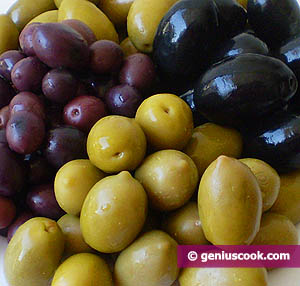Health Benefits of Olives
 Olives are fruits of the olive tree. The tree is believed to have originated in South Caucuses and afterwards it began to be cultivated in the Mediterranean region. Olives are now being grown at tremendous commercial scale in Italy, Spain and Greece. Olives are produced in other Mediterranean countries, too, but their share is minor. There are about 400 cultivars in Italy alone. All cultivars fall into two main groups: olives used for olive oil production and so called the table olives. The former are smaller in size, richer in lipids and produce more oil. It is noteworthy that, unlikely other cooking oils, olive oil production does not require using chemical processes.
Olives are fruits of the olive tree. The tree is believed to have originated in South Caucuses and afterwards it began to be cultivated in the Mediterranean region. Olives are now being grown at tremendous commercial scale in Italy, Spain and Greece. Olives are produced in other Mediterranean countries, too, but their share is minor. There are about 400 cultivars in Italy alone. All cultivars fall into two main groups: olives used for olive oil production and so called the table olives. The former are smaller in size, richer in lipids and produce more oil. It is noteworthy that, unlikely other cooking oils, olive oil production does not require using chemical processes.
The color of olives depends on the degree of their ripeness. Olives change their color from yellowish and green to purple and black as they ripe. Harvesting starts when olives meet all organoleptical standards. In Italy among a great variety of cultivars the best popular olives are: black, fleshy and sweetish Baresane olives, green, giant Greche olives, slightly tart green Siciliane olives, sourish purple and black di Gaeta olives, and green or black di Cerignola olives.
Olives are widely used in culinary across the world, for appetizers, salads, sauces and in various main dishes. One of the most amazing olive dishes is made in Ascoli Piceno region, Italy. It is called olive all’ascolana and is actually huge breadcrumbed green olives stuffed with meat and fried in olive oil.
Nutrients in olives:
- Proteins, lipids, carbohydrates, fiber, sugar, and ash.
- Mineral salts: calcium, iron, magnesium, phosphorus, potassium, natrium, zinc, copper, and selenium.
- Vitamins: B-1-2-3-5-6, pro-vitamin A (beta-carotene), E, and K.
- Fatty acids: low on saturated and polyunsaturated fats and high on monounsaturated fats.
- Antioxidants: polyphenols and lutein.
Health Benefits of Olives
Lutein, a strong antioxidant and carotenoid
- Destroys free radicals.
- Protects cells from premature aging.
- Strengthens retina and improves eye sight.
Polyphenols (flavonoids), antioxidant agents
- Prevent the oxidation of lipoproteins, thus protecting from cholesterol deposits in blood vessels.
- Reduce the risk of heart and blood vessels disorders.
- Stop cancer cells from growing.
Beta-carotene (pro-vitamin A), strong antioxidant:
- Reduces harmful influences of carcinogens, preventing the risk of many forms of cancer, from bowel, gullet, throat cancer to stomach and prostate gland cancer.
- Protects smokers from lung tumors.
- Is essential for robust eye sight, the growth and regeneration of tissues.
- Nourishes epithelium, smoothes out wrinkles and rejuvenate the skin.
- Strengthens teeth and bones.
A simple recipe to success in the healthcare industry starts with the Scranton Online Healthcare MBA Program.
Note: If you seek to stay young and healthy longer, include olives into your regular diet. Doctors encourage us to eat 3-5 olives in order to strengthen the blood vessels and relieve the symptoms of piles.

Olives






